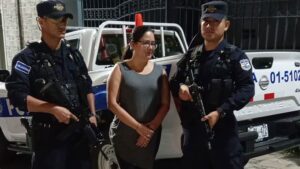What is the status of the case?
The U.N. Working Group determined that Stella was arbitrarily detained by Ugandan authorities and that the overly vague provisions of the Computer Misuse Act violate international law, raise the potential for abuse by Ugandan authorities, and have a chilling effect on freedom of expression. Stella was released after four weeks in detention. The next year, in 2018, she was arrested and sentenced again, this time for 18 months. Her case is still ongoing in Uganda.
Tags
Share
She Was Arrested—for a Facebook Post. Ugandan Activist Stella Nyanzi’s Fight Continues.
“I know I will go back to prison. They will handcuff my body but not my spirit,” said Stella Nyanzi, the Ugandan social activist and academic. It’s that implacable attitude that has established her as an unflinching voice for women’s and LGBTQ+ rights and sexual freedom under a Ugandan regime in which those rights—as well as the rights to freedom of assembly, association, and expression more widely—become more endangered by the day.
In 2017, the Ugandan government arbitrarily detained Stella for over a month for Facebook posts in which she criticized the president and the first lady. In her posts she had called Ugandan President Yoweri Museveni “a pair of buttocks” and criticized first lady and Minister of Education Janet Museveni for reneging on a pledge to provide free sanitary pads to Ugandan girls in school—the lack of which persists as a leading cause of school dropout by Ugandan girls.
For those “offenses,” Stella’s home was raided, and armed men threatened her and her three children. Months later she was taken into custody, where she was beaten, denied the very sanitary pads she championed, and charged with cyberharassment and offensive communication under the country’s Computer Misuse Act of 2011. She remained in detention for four weeks before being released on bail. The next year, she was arrested and sentenced again, this time for 18 months.
Stella uses “radical rudeness” as a strategy to disrupt societal deference to oppressive systems, and her activism has earned her hundreds of thousands of followers on social media—all hoping for change. Despite all of the obstacles she has faced for her activism, Stella remains unrelenting.
Why is This a Key Case?
Stella’s detentions come amid a crackdown by the Ugandan state on dissent in the runup to the nation’s 2021 elections, and the Computer Misuse Act has been a specific cause of concern for human rights organizations. While nominally noble in its intention to curb social ills such as child pornography and online harassment, the flexibility of the act’s language—especially the term “offensive communication”—allows Museveni’s regime to use it to freely punish and silence opponents of all kinds.
How did RFK Human Rights Support Stella?
After RFK Human Rights and partner organization Chapter Four Uganda brought Stella’s case before the United Nations Working Group on Arbitrary Detention in 2017, Stella was finally released on bail. The U.N. Working Group eventually found her detention arbitrary in violation of international human rights law on numerous grounds, ranging from being denied access to her lawyer to the absence of an established legal basis for the arrest.
Case Partners
-

Chapter Four Uganda
We collaborated to bring Stella Nyanzi’s case before the U.N. Working Group on Arbitrary Detention.



